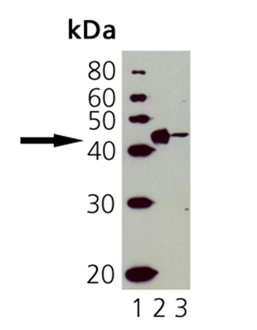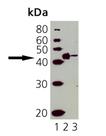Product Details
| Alternative Name: | TNFRSF 5 |
| |
| Host: | Rabbit |
| |
| Immunogen: | Synthetic peptide corresponding to 20 residues of human CD40. |
| |
| UniProt ID: | P25942 |
| |
| Source: | Purified from rabbit serum. |
| |
| Species reactivity: | Human, Mouse, Rat
Bovine, Dog, Guinea pig, Hamster, Monkey, Porcine, Rabbit, Sheep
|
| |
| Applications: | WB
|
| |
| Recommended Dilutions/Conditions: | Western Blot (ECL, 1:200 – 1:1000)
Suggested dilutions/conditions may not be available for all applications.
Optimal conditions must be determined individually for each application. |
| |
| Application Notes: | Detects a band of ~45kDa by Western blot. |
| |
| Purity Detail: | Peptide affinity purified. |
| |
| Formulation: | Liquid. In PBS containing 50% glycerol and 0.09% sodium azide. |
| |
| Shipping: | Blue Ice |
| |
| Long Term Storage: | -20°C |
| |
| Scientific Background: | CD40 is a 45-50 kDa type I membrane protein and a member of the tumor necrosis factor (TNF) receptor superfamily. CD40 is also known as pb50 or CDW40. CD40 is expressed primarily by professional antigen-presenting cells and it is also expressed on non-immune cell types. The CD40 expressed by professional antigen-presenting cells plays a critical role in co-stimulation and antigen-presenting cell activation in T cell-dependent immune responses. Signals generated through CD40 in B cells are anti-apoptotic. These signals are also required for T cell-dependent B cell activation and proliferation, isotype switching, up-regulation of costimulatory receptors, germinal center formation and memory generation. CD40 signal transduction is initiated by binding trimeric CD40 ligand (CD40L) which is found on the surface of activated T cells. CD40 engages several signalling pathways in B cells and these include NF-kB, the mitogen-activated protein kinases p38 and c-Jun N-terminal kinase. The 62 amino acid cytoplasmic domain (CD40c) of CD40 contains two linear TNF-receptor associated factor (TRAF) binding domains. The membrane proximal site of CD40c binds TRAF6 and the membrane distal site binds TRAF1, 2 and 3. CD40c is thought to mediate the CD40-dependant signalling pathways by recruitment of TRAF to this multimerized domain. CD40 ligation has also been shown to stimulate iNOS expression, and therefore NO production, by activating NF-kB in IFN-g treated microglial cells. NO derived from microglia has been implicated in the damage of myelin-producing oligodendrocytes in demyelinating disorders like multiple sclerosis (MS) and neuronal death during Alzheimer’s disease and brain trauma. Increased CD40-CD40 ligation has been implicated in the pathogenesis of several autoimmune inflammatory diseases, such as MS, arthritis and insulin-dependant diabetes. |
| |
| Regulatory Status: | RUO - Research Use Only |
| |

Western Blot Analysis of CD40: Lane 1: MWM, Lane 2: ESK4 cell lysate, Lane 3: Molt 4 cell lysate.
Please mouse over
Product Literature References
Porcine cluster of differentiation (CD) markers 2018 update: H.D. Dawson, et al.; Res. Vet. Sci.
118, 199 (2018),
Abstract;
Related Products












